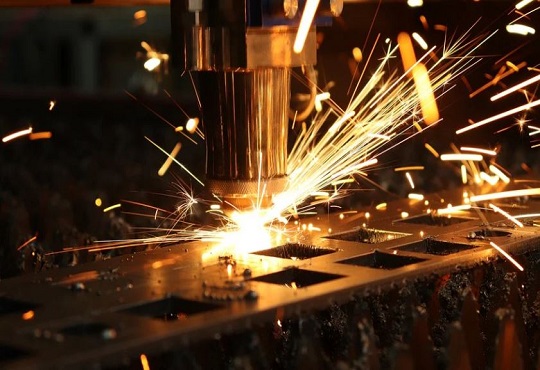The benefits of CNC machines in the production process
cioreviewindia Team | Monday, 15 November 2021, 08:34 IST
 There are numerous requirements and components to the production process in Production Industries. CNC machines have been used to assist in meeting all of the requirements that the production process necessitates. Suppose a company is required to manufacture thousands of items in a short period of time. These tasks are impossible to complete manually, and doing so would consume a significant amount of time. To meet the demands of such situations, CNC machines may be employed in order to manufacture these units within the specified time frame. CNC machines make certain that several machines are produced accurately and precisely several times without making any mistakes. They are also scalable and produce materials that are of exceptional quality.
There are numerous requirements and components to the production process in Production Industries. CNC machines have been used to assist in meeting all of the requirements that the production process necessitates. Suppose a company is required to manufacture thousands of items in a short period of time. These tasks are impossible to complete manually, and doing so would consume a significant amount of time. To meet the demands of such situations, CNC machines may be employed in order to manufacture these units within the specified time frame. CNC machines make certain that several machines are produced accurately and precisely several times without making any mistakes. They are also scalable and produce materials that are of exceptional quality.
Using CNC machines, businesses can achieve the desired tolerance and finish while also utilizing a variety of different materials in their production. This post explains the benefits of using CNC machines in the production process.
Precision and Tolerance
The most important thing to consider during the production process is ensuring that the items produced are identical in terms of both shape and dimension. As a result, the most important thing is to ensure that all of the items that are produced have the same dimensions. This is made possible through the use of CNC machines. As a result, unless the specifics of the dimensions have been changed, your CNC machines will produce items that are identical to those that you have specified in your CAD.
The precision achieved through the use of CNC machines is consistent across all machine parts manufactured.
Furthermore, this level of precision aids in the definition of your tolerance, allowing for greater flexibility throughout the process. When compared to a variety of other machines. CNC machines are capable of providing extremely tight tolerances.
Repeatability
In the case of CNC machines, it is simple to reproduce an item that was previously manufactured with the same precision and accuracy as it was done the first time. This is due to the fact that CNC machines operate on code that has already been preprogrammed. As a result, this code is responsible for controlling all of the required functionality. Furthermore, this repeatability happens when the machine goes to an appropriate position several repetitions with only a subtle variation in distance between each movement and the previous movement.
Materials
When it comes to the materials that are used, CNC machines are extremely adaptable and can work with virtually any type of material that is available. Materials such as aluminum, copper, plastic, bronze, stainless steel, and brass are just a few examples of the types of materials that can be worked with CNC machines.
Material hardness, wear resistance, and strength endurance are all factors that CNC machines can take into consideration when selecting a material for use.
A material's hardness is defined as the ability of a material or structure to withstand point surface loads, which is measured in millimeters. The material's endurance strength indicates how well a material is able to withstand stress. Tensile strength, on the other hand, simply indicates how resistant a material is to breaking when subjected to tension.
Finishes
With CNC machines, you have the option of using a variety of finishes on the prototypes that you have created. The characteristics that influence material roughness, including overall smoothness as well as the perpendicular distance from the top to the valley of an irregularity, may also be precisely controlled using these devices.
CNC machining outperforms other production techniques in that it allows engineers to choose from a variety of specially made finishes that are tailored to specific design parameters. When it comes to rotating shafts, a smooth polished texture might well be required, whereas load-bearing objects can function properly with a slightly rough texture, which could also reduce cost as well as turnaround time.
Scalability
Compared to other production methods, CNC machines tend to provide greater scalability when it comes to CNC production processes, which is why they are so popular. As a result, these machines are more efficient when compared to other types of machines.
With CNC machines, you will be able to produce machines in a precise and consistent manner over and over again. This, in turn, has an effect on the amount of production you are able to produce.
When it comes to producing greater quantities of parts and components speedily, machining may be the only option available. In the case of 5000 steel metal components, for example, CNC machining is the most cost-effective, if not the only, method of producing the parts.
Machine parts, and also prototypes, can be produced very quickly with greater precision and tolerance, along with tailored finishes, in virtually any sort of material using CNC machines. In the end, it enables you to bring a higher overall product to market more quickly than previously possible.
Are there disadvantages to CNC Machines?
We can't talk about the advantages of CNC machines for the production process without also talking about the disadvantages. Although these drawbacks are significant, they are far outweighed by the advantages that CNC machines bring to the production process.
Cost
Regarding costs, CNC machines are prohibitively expensive when compared to other technologies that may be used in the production process, such as 3D printing.
CNC machining, on the other hand, is more cost-effective for larger quantities. As a result of the compositional process, there is greater waste, whereas 3D printing just utilizes whatever material is actually required.
Skill
CNC machining necessitates the use of engineers who are familiar with the software's operation. It is necessary to know how both software, as well as machine shop tools, work in order to operate the drills, lathes, cutter, mills as well as other forms of equipment in a machine shop. This knowledge is becoming increasingly common among machinists who enter the job market.
Conclusion
As we have seen in this article, CNC machines have a number of advantages in the production process. We can also see that, despite the fact that CNC machines have some disadvantages, the advantages of using them outweigh the disadvantages that these machines provide in terms of productivity. Using CNC machining, fast and easy prototypes can be produced with better accuracy and tolerance—as well as with customized finishes—in virtually any sort of material. In the end, it enables you to deliver some possibly higher products to the market more quickly than previously possible. For more information visit this website https://www.wmtcnc.com/




.jpg)